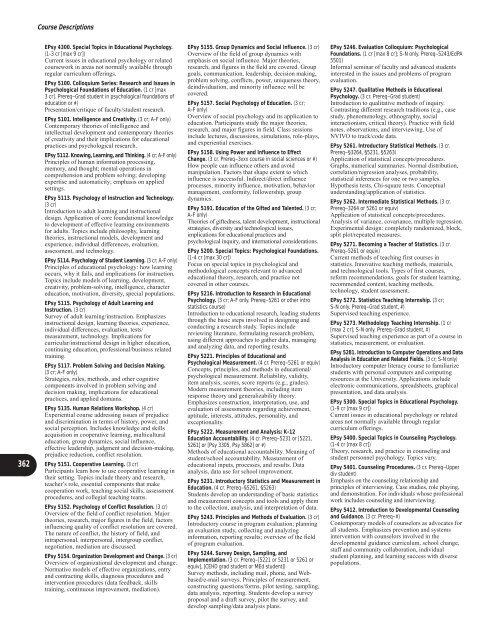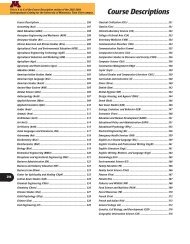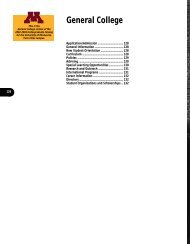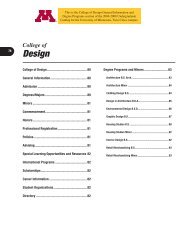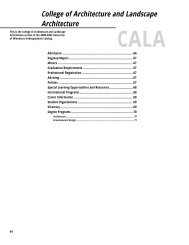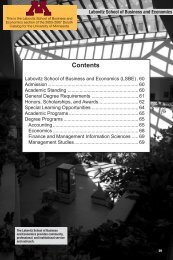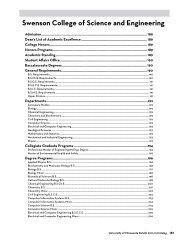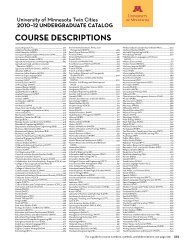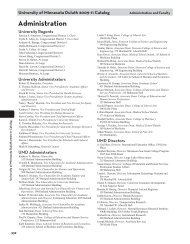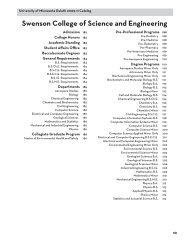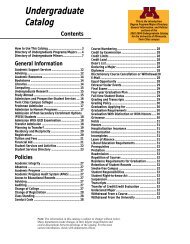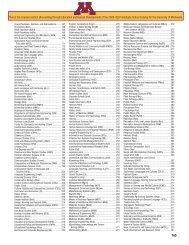CoursesâCSCI through FSCN - University Catalogs - University of ...
CoursesâCSCI through FSCN - University Catalogs - University of ...
CoursesâCSCI through FSCN - University Catalogs - University of ...
Create successful ePaper yourself
Turn your PDF publications into a flip-book with our unique Google optimized e-Paper software.
Course Descriptions362EPsy 4300. Special Topics in Educational Psychology.(1-3 cr [max 9 cr])Current issues in educational psychology or relatedcoursework in areas not normally available <strong>through</strong>regular curriculum <strong>of</strong>ferings.EPsy 5100. Colloquium Series: Research and Issues inPsychological Foundations <strong>of</strong> Education. (1 cr [max3 cr]. Prereq–Grad student in psychological foundations <strong>of</strong>education or #)Presentation/critique <strong>of</strong> faculty/student research.EPsy 5101. Intelligence and Creativity. (3 cr; A-F only)Contemporary theories <strong>of</strong> intelligence andintellectual development and contemporary theories<strong>of</strong> creativity and their implications for educationalpractices and psychological research.EPsy 5112. Knowing, Learning, and Thinking. (4 cr; A-F only)Principles <strong>of</strong> human information processing,memory, and thought; mental operations incomprehension and problem solving; developingexpertise and automaticity; emphasis on appliedsettings.EPsy 5113. Psychology <strong>of</strong> Instruction and Technology.(3 cr)Introduction to adult learning and instructionaldesign. Application <strong>of</strong> core foundational knowledgeto development <strong>of</strong> effective learning environmentsfor adults. Topics include philosophy, learningtheories, instructional models, development andexperience, individual differences, evaluation,assessment, and technology.EPsy 5114. Psychology <strong>of</strong> Student Learning. (3 cr; A-F only)Principles <strong>of</strong> educational psychology: how learningoccurs, why it fails, and implications for instruction.Topics include models <strong>of</strong> learning, development,creativity, problem-solving, intelligence, charactereducation, motivation, diversity, special populations.EPsy 5115. Psychology <strong>of</strong> Adult Learning andInstruction. (3 cr)Survey <strong>of</strong> adult learning/instruction. Emphasizesinstructional design, learning theories, experience,individual differences, evaluation, tests/measurement, technology. Implications forcurricular/instructional design in higher education,continuing education, pr<strong>of</strong>essional/business relatedtraining.EPsy 5117. Problem Solving and Decision Making.(3 cr; A-F only)Strategies, rules, methods, and other cognitivecomponents involved in problem solving anddecision making, implications for educationalpractices, and applied domains.EPsy 5135. Human Relations Workshop. (4 cr)Experiential course addressing issues <strong>of</strong> prejudiceand discrimination in terms <strong>of</strong> history, power, andsocial perception. Includes knowledge and skillsacquisition in cooperative learning, multiculturaleducation, group dynamics, social influence,effective leadership, judgment and decision-making,prejudice reduction, conflict resolution.EPsy 5151. Cooperative Learning. (3 cr)Participants learn how to use cooperative learning intheir setting. Topics include theory and research,teacher’s role, essential components that makecooperation work, teaching social skills, assessmentprocedures, and collegial teaching teams.EPsy 5152. Psychology <strong>of</strong> Conflict Resolution. (3 cr)Overview <strong>of</strong> the field <strong>of</strong> conflict resolution. Majortheories, research, major figures in the field, factorsinfluencing quality <strong>of</strong> conflict resolution are covered.The nature <strong>of</strong> conflict, the history <strong>of</strong> field, andintrapersonal, interpersonal, intergroup conflict,negotiation, mediation are discussed.EPsy 5154. Organization Development and Change. (3 cr)Overview <strong>of</strong> organizational development and change.Normative models <strong>of</strong> effective organizations, entryand contracting skills, diagnosis procedures andintervention procedures (data feedback, skillstraining, continuous improvement, mediation).EPsy 5155. Group Dynamics and Social Influence. (3 cr)Overview <strong>of</strong> the field <strong>of</strong> group dynamics withemphasis on social influence. Major theories,research, and figures in the field are covered. Groupgoals, communication, leadership, decision making,problem solving, conflicts, power, uniqueness theory,deindividuation, and minority influence will becovered.EPsy 5157. Social Psychology <strong>of</strong> Education. (3 cr;A-F only)Overview <strong>of</strong> social psychology and its application toeducation. Participants study the major theories,research, and major figures in field. Class sessionsinclude lectures, discussions, simulations, role-plays,and experiential exercises.EPsy 5158. Using Power and Influence to EffectChange. (3 cr. Prereq–3xxx course in social sciences or #)How people can influence others and avoidmanipulation. Factors that shape extent to whichinfluence is successful. Indirect/direct influenceprocesses, minority influence, motivation, behaviormanagement, conformity, followership, groupdynamics.EPsy 5191. Education <strong>of</strong> the Gifted and Talented. (3 cr;A-F only)Theories <strong>of</strong> giftedness, talent development, instructionalstrategies, diversity and technological issues,implications for educational practices andpsychological inquiry, and international considerations.EPsy 5200. Special Topics: Psychological Foundations.(1-4 cr [max 30 cr])Focus on special topics in psychological andmethodological concepts relevant to advancededucational theory, research, and practice notcovered in other courses.EPsy 5216. Introduction to Research in EducationalPsychology. (3 cr; A-F only. Prereq–5261 or other introstatistics course)Introduction to educational research, leading students<strong>through</strong> the basic steps involved in designing andconducting a research study. Topics includereviewing literature, formulating research problem,using different approaches to gather data, managingand analyzing data, and reporting results.EPsy 5221. Principles <strong>of</strong> Educational andPsychological Measurement. (4 cr. Prereq–5261 or equiv)Concepts, principles, and methods in educational/psychological measurement. Reliability, validity,item analysis, scores, score reports (e.g., grades).Modern measurement theories, including itemresponse theory and generalizability theory.Emphasizes construction, interpretation, use, andevaluation <strong>of</strong> assessments regarding achievement,aptitude, interests, attitudes, personality, andexceptionality.EPsy 5222. Measurement and Analysis: K-12Education Accountability. (4 cr. Prereq–5231 or [5221,5261] or [Psy 3305, Psy 5862] or #)Methods <strong>of</strong> educational accountability. Meaning <strong>of</strong>student/school accountability. Measurement <strong>of</strong>educational inputs, processes, and results. Dataanalysis, data use for school improvement.EPsy 5231. Introductory Statistics and Measurement inEducation. (4 cr. Prereq–§5261, §5263)Students develop an understanding <strong>of</strong> basic statisticsand measurement concepts and tools and apply themto the collection, analysis, and interpretation <strong>of</strong> data.EPsy 5243. Principles and Methods <strong>of</strong> Evaluation. (3 cr)Introductory course in program evaluation; planningan evaluation study, collecting and analyzinginformation, reporting results; overview <strong>of</strong> the field<strong>of</strong> program evaluation.EPsy 5244. Survey Design, Sampling, andImplementation. (3 cr. Prereq–[5221 or 5231 or 5261 orequiv], [CEHD grad student or MEd student])Survey methods, including mail, phone, and Webbased/e-mailsurveys. Principles <strong>of</strong> measurement,constructing questions/forms, pilot testing, sampling,data analysis, reporting. Students develop a surveyproposal and a draft survey, pilot the survey, anddevelop sampling/data analysis plans.EPsy 5246. Evaluation Colloquium: PsychologicalFoundations. (1 cr [max 8 cr]; S-N only. Prereq–5243/EdPA5501)Informal seminar <strong>of</strong> faculty and advanced studentsinterested in the issues and problems <strong>of</strong> programevaluation.EPsy 5247. Qualitative Methods in EducationalPsychology. (3 cr. Prereq–Grad student)Introduction to qualitative methods <strong>of</strong> inquiry.Contrasting different research traditions (e.g., casestudy, phenomenology, ethnography, socialinteractionism, critical theory). Practice with fieldnotes, observations, and interviewing. Use <strong>of</strong>NVIVO to track/code data.EPsy 5261. Introductory Statistical Methods. (3 cr.Prereq–§3264, §5231, §5263)Application <strong>of</strong> statistical concepts/procedures.Graphs, numerical summaries. Normal distribution,correlation/regression analyses, probability,statistical inferences for one or two samples.Hypothesis tests, Chi-square tests. Conceptualunderstanding/application <strong>of</strong> statistics.EPsy 5262. Intermediate Statistical Methods. (3 cr.Prereq–3264 or 5261 or equiv)Application <strong>of</strong> statistical concepts/procedures.Analysis <strong>of</strong> variance, covariance, multiple regression.Experimental design: completely randomized, block,split plot/repeated measures.EPsy 5271. Becoming a Teacher <strong>of</strong> Statistics. (3 cr.Prereq–5261 or equiv)Current methods <strong>of</strong> teaching first courses instatistics. Innovative teaching methods, materials,and technological tools. Types <strong>of</strong> first courses,reform recommendations, goals for student learning,recommended content, teaching methods,technology, student assessment.EPsy 5272. Statistics Teaching Internship. (3 cr;S-N only. Prereq–Grad student, #)Supervised teaching experience.EPsy 5273. Methodology Teaching Internship. (1 cr[max 2 cr]; S-N only. Prereq–Grad student, #)Supervised teaching experience as part <strong>of</strong> a course instatistics, measurement, or evaluation.EPsy 5281. Introduction to Computer Operations and DataAnalysis in Education and Related Fields. (3 cr; S-N only)Introductory computer literacy course to familiarizestudents with personal computers and computingresources at the <strong>University</strong>. Applications includeelectronic communications, spreadsheets, graphicalpresentation, and data analysis.EPsy 5300. Special Topics in Educational Psychology.(1-9 cr [max 9 cr])Current issues in educational psychology or relatedareas not normally available <strong>through</strong> regularcurriculum <strong>of</strong>ferings.EPsy 5400. Special Topics in Counseling Psychology.(1-4 cr [max 8 cr])Theory, research, and practice in counseling andstudent personnel psychology. Topics vary.EPsy 5401. Counseling Procedures. (3 cr. Prereq–Upperdiv student)Emphasis on the counseling relationship andprinciples <strong>of</strong> interviewing. Case studies, role playing,and demonstration. For individuals whose pr<strong>of</strong>essionalwork includes counseling and interviewing.EPsy 5412. Introduction to Developmental Counselingand Guidance. (3 cr. Prereq–#)Contemporary models <strong>of</strong> counselors as advocates forall students. Emphasizes prevention and systemsintervention with counselors involved in thedevelopmental guidance curriculum, school change,staff and community collaboration, individualstudent planning, and learning success with diversepopulations.


